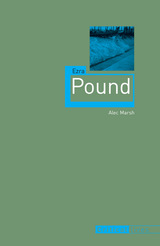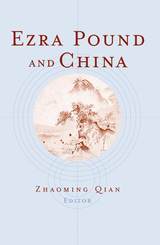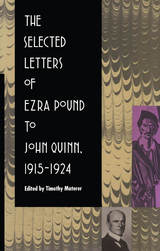


Richly illustrated, the book draws readers closer to the heart of Pound's vision. Ezra Pound and China will become an invaluable resource to students and scholars of Pound, cultural studies, translation theory, poetics, Confucianism, and literary transmission and reception.
Zhaoming Qian is Professor of English, the University of New Orleans.

Pound was deeply affected by her death, as was the poet H. D., who had recently come to know her. Pound's letters to Cravens, extensively annotated, are published here for the first time; her suicide note to him is also included. Ezra Pound and Margaret Cravens contains photographs and previously unpublished material by Pound and H.D., as well as an excerpt from H.D.'s autobiographical novel Asphodel, in which Cravens figures prominently. This portrait of a friendship provides insight into the literary achievements of Pound and H.D. and tells the unknown story of Margaret Cravens's tragic life.

Written by Pound in the months following his first visit, the four poems grouped as "The Malatesta Cantos" celebrate the church and the man who sponsored its construction, Sigismondo Malatesta. Upon receiving news of the building's devastation by Allied bombings in 1944, Pound wrote two more cantos that invoked the event as a rallying point for the revival of fascist Italy. These "forbidden" cantos were excluded from collected editions of his works until 1987. Pound even announced an abortive plan in 1958 to build a temple inspired by the church, and in 1963, at the age of eighty, he returned to Rimini to visit the Tempio Malatestiano one last, haunting time.
Drawing from hundreds of unpublished materials, Rainey explores the intellectual heritage that surrounded the church, Pound's relation to it, and the interpretation of his work by modern critics. The Malatesta Cantos, which have been called "one of the decisive turning-points in modern poetics" and "the most dramatic moment in The Cantos," here engender an intricate allegory of Pound's entire career, the central impulses of literary modernism, the growth of intellectual fascism, and the failure of critical culture in the twentieth century. Included are two-color illustrations from the 1925 edition of Pound's cantos and numerous black-and-white photographs.

Drawing upon this key five-volume work, as well as comprehensive research in both primary and secondary sources, Miyake brings the partial perceptions of other critics and commentators into an illuminating whole. Disclosing the deliberateness of The Cantos, Miyake provides new insight into Pound’s sense of culture and into the nature of his Confucianism. She sheds light on the disastrous path Pound followed into Fascism and anti-Semitism, and, in contrast to the image of a “pagan” Pound that has emerged in recent years, reveals a poet writing as a Christian from within the Christian mythical tradition.

At the beginning of this century, Remy de Gourmont was the embodiment of the literary avant-garde, not only for urbane European writers but for “American imbeciles,” in Ezra Pound's term. As this book shows, Pound himself was one of the many young artists who learned from him. Gourmont was a brilliant teacher, and the breadth of his imagination and the scope of his interests had a special impact on Pound, whose “provincial” mind was moving in the same ways but without the so-called civilized places to go.
Instead of elaborately tracing influences or sources, Sieburth juxtaposes various aspects of Gourmont's and Pound's works in order to arrive at a better understanding of their individual achievements as “instigators.” In doing so, he reveals unexplored dimensions of Pound's development—from his early reading of vers fibre to his discovery, through Gourmont, of the French Enlightenment. Pound emerges as a modern-day philosophe, and Sieburth's reevaluation casts new light on Pound's complex political ideas and on difficult areas of the late Cantos.

T. S. Eliot and Ezra Pound dominated English poetry and criticism in the first half of the twentieth century. At the center of their practice is what Maud Ellmann calls the poetics of impersonality. Her examination yields a set of superb readings of the major poems of the modernist canon. Eliot and Pound mounted attack after attack on nineteenth-century poetry from Wordsworth to Swinburne, poetry they believed nurtured an unhealthy cult of the self. They wanted poetry to be a transparent medium that gives its readers access to reality and meaning. Poetry, they argued, should efface itself, because writing that calls attention to itself calls attention to the distinctive personality of the writer. Ellmann convincingly shows that their arguments are self-contradictory and that their efforts to eliminate personality merely reinstate it in a different guise.
After an initial section on Eliot’s relation to Bergson, Ellmann goes on to analyze Eliot’s “Tradition and the Individual Talent” and the later After Strange Gods, the early poems, The Waste Land, and Four Quartets; she then turns to Pound’s Personae, particularly “Mauberley,” and the Cantos. Ellmann looks for the contradictions inherent in modernist literary ideology and deftly teases out their implications. Her writing is stylish in the best sense and, in terms of its theoretical vocabulary and assumptions, impeccable. This book marks the debut of a major literary critic.

About the origins of Anglo-American poetic modernism, one thing is certain: it started with a notion of the image, described variously by Ezra Pound as an ideogram and a vortex. We have reason to be less confident, however, about the relation between these puzzling conceptions of the image and the doctrine of literary positivism that is generally held to be the most important legacy of Imagism. No satisfactory account exists, moreover, of what bearing these foundational principles may have on Pound's later engagement with fascism. Nor is it clear how figures such as the vortex and the ideogram might contribute generally to our understanding of modern visual culture and its compulsive appeal.
Radio Corpse addresses these issues and offers a fundamental revision of one of the most powerful and persistent aesthetic ideologies of modernism. Focusing on the necrophilic dimension of Pound's earliest poetry and on the inflections of materiality authorized by the modernist image, Daniel Tiffany establishes a continuum between Decadent practice and the incipient avant-garde, between the prehistory of the image and its political afterlife, between what Pound calls the "corpse language" of late Victorian poetry and a conception of the image that borrows certain "radioactive" qualities from the historical discovery of radium and the development of radiography. Emphasizing the phantasmic effects of translation (and exchange) in Pound's poetry, Tiffany argues that the cadaverous--and radiological--properties of the image culminate, formally and ideologically, in Pound's fascist radio broadcasts during World War II. Ultimately, the invisibility of these "radiant" images places in question basic assumptions regarding the optical character of images--assumptions currently being challenged by imageric technologies such as magnetic resonance imaging and positron emission tomography.

Pound wrote to John Quinn—a New York lawyer, an expert in business law, and a collector of unusual taste and discrimination—about these artists and many more, urging him to support their journals, collect their manuscripts, and buy and exhibit their paintings and sculptures. Quinn at one time owned manuscripts of Ulysses and The Waste Land, Brancusi’s sculpture Mlle. Pogany, and Picasso’s painting Three Musicians. Yet he was often skeptical about the value of new schools of art, such as Vorticism, and disturbed by the outspokenness of authors such as Joyce. Pound’s letters are unusually tactful when he counters Quinn’s doubts and explains the premises of experimental art. Pound’s letters to Quinn are touched with his characteristic humor and wordplay and are especially notable for their lucidity of expression, engendered by Pound’s deep respect for Quinn.
READERS
Browse our collection.
PUBLISHERS
See BiblioVault's publisher services.
STUDENT SERVICES
Files for college accessibility offices.
UChicago Accessibility Resources
home | accessibility | search | about | contact us
BiblioVault ® 2001 - 2024
The University of Chicago Press









